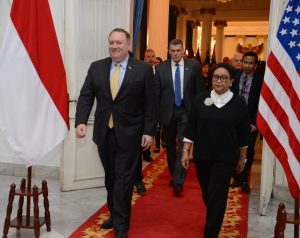Since the beginning of the COVID-19 pandemic, it has become evident how China has used the public health crisis in order to bolster its influence in Southeast Asia, at the expense of the United States. China has granted significant support to the Association of Southeast Asian Nations to address the pandemic, while promising to be a close partner in the region’s slow economic recovery from the contagion.
Beijing’s approach to Indonesia encapsulates its approach well. Last month, Indonesia secured access to COVID-19 vaccines from China’s drug company Sinovac, which will test, manufacture and distribute the vaccine within Indonesia. The agreement was officially signed during the visit of Foreign Minister Retno Marsudi and State-owned Enterprises Minister Erick Thohir to China in August. Following this, Luhut Pandjaitan, President Joko “Jokowi” Widodo’s special envoy, met his counterpart Wang Yi and again reiterated Indonesia’s interest in gaining access to Chinese-made vaccines.
These visits by both countries’ officials demonstrate the progress in relations between Indonesia and China, and prompt an intriguing question about the future of U.S.-Indonesia relations. Despite appearances, however, the U.S. is not sitting on its hands.
Last month, the U.S. Secretary of State Mike Pompeo visited Indonesia to affirm the two countries’ vision of a “free and open” Indo-Pacific and deliver a speech before one of the most consequential Islamic groups in Indonesia, Nahdatul Ulama. His visit, like the other stops on his Asian tour, aimed to gain regional support in containing Chinese ambitions.
Pompeo’s visit was preceded by a series of meetings and interactions from high-level American officials, who have sought to bolster ties between Washington and Jakarta and thus compete with China’s COVID-19 charm offensive. Late last month, officials from the Export-Import Bank of the United States (EXIM) and the U.S. International Development Finance Corporation (DFC) concluded visits to Indonesia, pledging $750 million of potential investment in communication technology, health care, broadcasting and vital infrastructure.
This came shortly after Defense Minister Prabowo Subianto visited the U.S. at the invitation of his counterpart, Mark Esper, the first visit by an Indonesian minister of defense in decades. During the five-day visit, the pair discussed various forms of security cooperation.
As I argued in my previous article for The Diplomat, Indonesia-U.S. relations currently face a number of strategic challenges. The most difficult one is to convince President Jokowi that the U.S. is equally relevant to the fulfillment to his domestic goals as a deep-pocketed China. The only way for the U.S. to generate more enthusiasm for the underperforming bilateral relationship is for it to make a concrete contribution to Jokowi’s domestic agenda. Presently, the most important priorities are the public health and economic challenges posed by COVID-19. The U.S. lags one or more steps behind China in terms of vaccine cooperation. If this situation continues, it might be difficult for Washington to gain Jakarta’s attention, at least as long as the pandemic lasts.
As part of its economic recovery plans, the Indonesian government recently pledged to establish a sovereign wealth fund in order to attract more foreign investment. The fund is expected to contain 75 trillion rupiah ($5.2 billion) in capital. Already, the United Arab Emirates and Japan’s SoftBank conglomerate have shown an interesting in joining. The U.S., too, should take this as an opportunity to rejuvenate its bilateral relationship and chart a new path of strategic economic cooperation, especially in the evolving post-COVID-19 world.
Against this backdrop, however, the following strategic challenges in U.S.-Indonesia relationships remain. First, Jokowi is not especially interested in foreign policy questions, especially if they don’t bring practical benefits, something that the U.S. is only beginning to address. Second, the American approach of blaming China for the COVID-19 pandemic and attempting to hold Beijing responsible does not fit into Indonesia’s traditional preference for a “free and active” foreign policy, one that eschews great power alignments. Retno has on several occasions pointed out Indonesia’s disinterest in being trapped in the middle of the burgeoning U.S.-China rivalry.
Third, Washington’s recent flurry of high-level diplomatic engagement cannot make up for three and a half years of fleeting, episodic engagement. Indonesia’s foreign policy decision-makers are likely to interpret the recent attention as a reaction to China’s robust engagement with Indonesia, rather than a proactive commitment to the bilateral relationship per se.
On top of this, the U.S. government also seems to have mistaken the possible contours of cooperation with Indonesia. Recently, Jokowi reportedly rejected an American proposal to host spy planes in the country despite the country’s constitution not permitting its participation in any military bloc or alliance.
In comparison, Japan’s government offers the U.S. a more effective strategy for engaging Indonesia. This was on display during the recent visit of Prime Minister Suga Yoshihide, who chose Indonesia as one of the two destinations for his first overseas trip. The main points of the discussion mostly related to the COVID-19 pandemic and economic recovery, without placing a heavy focus on conscripting Indonesia into support for Japan’s security agenda.
As it stands, the election of Joe Biden is likely to lead to change in both the tenor and substance of American foreign policy, which in turn will affect the state of U.S.-Indonesia relations. But the future remains uncertain. To a great extent, the newly appointed ambassadors to Washington and Jakarta, Ambassador Muhammad Lutfi and Sung Yong Kim, have the potential to chart a new approach. The optimistic reading is that the Indonesia-U.S. relationship is set to improve, if the U.S. can better meet align its approach with Jokowi’s domestic interests, and cease viewing the relationship solely through the lens of China.

































